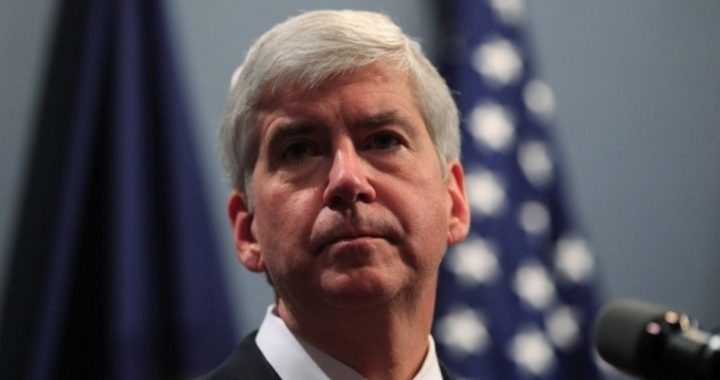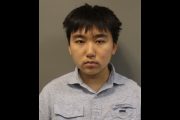
On Tuesday, Michigan Governor Rick Snyder vetoed a bill that would have allowed gun owners with extra training to carry concealed weapons in schools, day care centers, churches, and stadiums. The measure was passed by the state legislature last Thursday in what the Detroit Free Press described as “the final hours of a frenetic lame-duck session, in which all sorts of controversial legislation was passed and sent to Snyder.” Passage came one day before the fatal shooting of 20 first-grade students and six adults at the Sandy Hook Elementary School in Newtown Connecticut on Friday, but the bill did not go to the governor until Tuesday afternoon, the Free Press reported.
In his veto message, sent to the lawmakers shortly before 4 p.m., the governor said the bill lacked a provision that would have allowed institutions to opt out and prohibit concealed weapons on their own authority.
“I believe that it is important that these public institutions have clear legal authority to ban weapons from their premises,” Snyder wrote. “Each is entrusted with the care of a vulnerable population and should have the authority to determine whether its mission would be enhanced by the addition of concealed weapons.”
The governor had been under intense pressure to veto the bill, with many opponents citing the mass killing in Connecticut as evidence of the need to keep guns out of schools. Some expressed relief Tuesday at news of the veto.
“In light of the tragic loss of children’s lives in Connecticut, this was simply not the time to recklessly advance the expansion of concealed weapons in Michigan,” said state Rep. Shanelle Jackson, a Democrat from Detroit. “Instead, our policies should focus on improving the safety of our children and the quality of their schools, including the provision of mental health care to our kids who need it.”
“Firearms have absolutely no place in our schools,” said David Hecker, president of the American Federation of Teachers in Michigan. “It’s our collective responsibility to protect our children and make schools safe sanctuaries.”
“We need more math and science teachers in our classrooms, not more guns,” said Zach Pohl, executive director of Progress Michigan. State Rep. Jim Townsend, a Democrat from Royal Oak, said rules about weapons “must be made carefully and with deliberation. That was not the case with this bill.” The Michigan Catholic Conference objected to the effect the bill might have on churches.
“Allowing for an indeterminable number of permit holders to carry concealed in a place of worship was not good public policy to begin with,” said a statement issued by the church group. “Churches are meant to be a place of sanctuary for worshipers to gather in peace and free of the threat of gun violence.”
Speaker of the House Jesse Bolger (R-Marshall) said it is “unfortunate a compromise was not reached that the governor could support.” He noted that the veto does not affect the state law permitting carrying handguns openly.
“With this veto, however, open-carry still exists in schools, churches and other public areas, and we know that criminals do not respect gun-free zones,” Bolger said. “For these reasons, we will continue to work with the governor to best protect our law-abiding citizens’ Second Amendment rights, as well as the safety and security of all of our citizens.”
The question of whether establishing “gun-free zones” around school buildings and grounds makes students and faculty safer has been a hot topic of debate, especially since the massacre at Virginia Tech in 2007, when a student at the university went on a shooting spree over a two-and-half-hour period that left 32 dead and 17 wounded in what remains the most deadly school shooting in U.S. history. Critics argue that banning weapons in public places is an invitation to mass murderers who approach gun-free zones with the confidence that no one will be able to fire back at them as they pursue their deadly mission. Supporters of gun bans, on the other hand, tend to dismiss the idea of armed citizens stopping mass killings as wishful thinking on the part of gun enthusiasts.
“There have been few if any cases in the United States in which an ordinary citizen with a gun stopped a mass shooting,” wrote New York Times columnist Nicholas D. Kristoff on the day after the Newtown killings. Yet gun rights advocates have pointed to a number of such incidents over the years, while accusing the major media of either ignoring or under-reporting them. Little media attention, for example, was given to the action taken by Vice Principal Joel Myrick in the 1997 shooting that killed two and wounded seven in Peal High School in Mississippi. Myrick retrieved his own gun from his truck and confronted the shooter, 16-year-old Luke Woodham, as he was attempting to drive away in his mother’s car. Authorities later learned he was on his way to the town’s junior high school to claim more victims. Myrick did not fire, but persuaded the youth to change his plans and surrender when he placed his Colt .45 against Woodham’s head.
A Parker Middle School dance at Nick’s Place restaurant in Edinboro, Pennsylvania, in 1998 turned deadly when 14-year-old Andrew Wurst shot and killed a teacher and wounded another teacher and two students. Nick’s Place owner James Strand, confronting Wurst with a shotgun, forced him to drop his gun, then held him at gunpoint until police arrived.
While some mass killers have ignored gun bans in and around schools, others have been noticeably uninhibited by any respect for a church as “a place of sanctuary for worshipers to gather in peace…” In an article published on The New American last summer, Bob Adelmann noted that the shooting deaths of 12 people and the wounding of 58 others by a mass murderer at an Aurora, Colorado movie theater in July was at least the second attempt at mass killing in that city in a three-month period. In April, a gunman killed a woman when he opened fire on a crowd in a local church parking lot. He would no doubt have killed others but for the quick response of Antonio Milow, an off-duty Denver police officer and a nephew of the woman killed. Milow shot and killed the gunman, Kiarron Parker, 29, who had recently been released from an Oklahoma prison after serving time for assaulting two police officers. Nearly everyone remembers the slaughter at the movie theater. Few remember, if they ever knew of, the mass murder prevented in the church parking lot.
A potential mass murder at New Life Church in Colorado Springs in December of 2007 was cut short when Jeanne Assam, a volunteer security guard, fired on a gunman who had just shot and killed two members of the congregation. Pastor Brady Boyd called Assam, a former Minneapolis, Minnesota, police officer, a “hero.”
“Three people are needlessly dead, but many more lives could have been lost,” he said.
Photo of Michigan Governor Rick Snyder: AP Images



